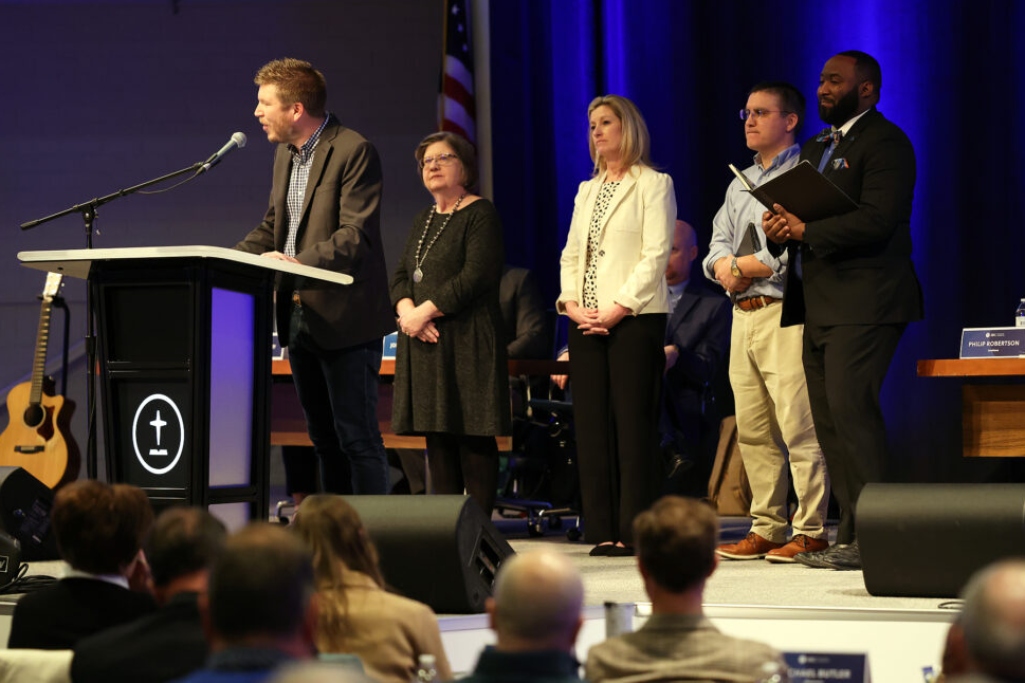
Josh Wester, chairman of the Abuse Reform Implementation Task Force, stands with fellow task force members during a report to the SBC Executive Committee at a meeting in Nashville, Tennessee, in February. Wester serves as lead pastor of Cornerstone Baptist Church in Greensboro, N.C.
The Abuse Reform Implementation Task Force (ARITF) is scheduled to report to messengers attending this year’s Southern Baptist Convention (SBC) annual meeting in Indianapolis on Tuesday, June 11 at 3:15 p.m. Josh Wester, lead pastor of Cornerstone Baptist Church in Greensboro, N.C., serves as chairman of the task force.
Wester was appointed chair of the ARITF last summer by SBC President Bart Barber after the group was granted an additional year to continue its work that began in 2022 when messengers approved the formation of the task force at that year’s SBC annual meeting in Anaheim, California.
We connected with Wester leading up to this year’s SBC annual meeting and asked him some questions about the task force, its work and the ARITF report that will be shared in Indianapolis this summer. Following are his responses to our questions, which have been lightly edited for length and clarity in some places.
What’s it been like for you since you were named to the Abuse Reform Implementation Task Force and also appointed its chairman almost a year ago?
It’s been a high honor to serve Southern Baptists in this role. To be honest, the scope and scale of the ARITF’s assignment is more than any one person can effectively wrap their arms around. Thankfully, Dr. Barber put together an incredible team of Southern Baptist pastors and lay people who are not only dedicated to the task but gifted and experienced in the work of abuse reform.
Our team puts in dozens of hours every single week working together with pastors, church leaders, survivors and various other professionals, including attorneys, counselors, insurance brokers, and technology and cyber security experts. Though the work seems inexhaustible, our team is constantly encouraged by the progress we’ve seen toward meaningful and lasting reform.
What were some of the challenges you faced as you stepped into the role?
The Southern Baptist Convention is unique. We have almost 50,000 churches, over 40 state conventions and more than 1,000 local associations, plus 12 national entities, all of which are autonomous. We’re not a top down organization. Everything is built upon cooperation. So when it comes to abuse reform, the ARITF is not handing down directives or mandates. We’re trying to provide simple, practical, sensible and achievable solutions for local churches and other parts of the SBC that provide obvious and immediate benefits. And to be clear, our task force believes the SBC’s polity is biblical and beautiful. Our job is to propose and implement reform measures that work with the grain of our polity, not against it.
How has the task force gone about its work over the past year?
At our first meeting in August, our team immediately identified three priorities to work toward. The first goal was to launch the Ministry Check website, which is a public online database of sexual offenders connected to the Southern Baptist Convention. As you might imagine, there were immense legal and technical hurdles to clear to make this a reality. But I’m happy to report this work is presently nearing the finish line.
Our second goal was to expand the Ministry Toolkit available via sbcabuseprevention.com with more practical tools and resources for churches to prevent and respond to sexual abuse. We will be releasing our “Essentials: Sexual Abuse Prevention and Response” curriculum at the annual meeting in a few weeks. This curriculum will provide a step-by-step guide for pastors and leaders to ensure their churches are being proactive in abuse prevention and are prepared to respond to any instance of abuse.
Our final goal was to secure a permanent home for abuse prevention and response for the SBC because we knew this work is simply too demanding and important to be shouldered by volunteers indefinitely.
Your team has worked closely with pastors, churches and ministry leaders across different levels of SBC life this past year. What have you discovered from those meetings and conversations?
We’ve learned so much. I would say, among the most important insights we’ve gleaned, is that when it comes to abuse, our churches overwhelmingly want to do the right thing. But so often, they don’t know where to turn for advice when they have questions or they’re trying to navigate a crisis. From the local church level to so many of our associations and state conventions, we’re seeing how great the need is for expert assistance with issues related to abuse — whether we’re talking about leading a church through crisis, caring for survivors or addressing difficult legal or ethical questions. That’s why our team has been so focused on a permanent home for abuse reform. We want Southern Baptists to know — regardless of where or how they are serving across our convention — where they can turn to get free and expert assistance with matters related to abuse.
What can you tell us about the task force’s forthcoming report to messengers at this year’s annual meeting?
We’re excited to bring our report to the messengers in June. The SBC has been calling for and working toward abuse reform since at least the 2018 annual meeting. And while our team is very aware of how much work is still to be done, we are excited to bring a report that demonstrates the real and meaningful progress that has been made to help our churches and entities more effectively prevent and respond to sexual abuse. We are anxious to put new tools in the hands of SBC pastors and leaders to help make our churches safe places for the most vulnerable, but also dangerous places for those who pose a threat to precious people made in God’s image.
You mentioned the curriculum for churches. What more can you tell us about that and how it will benefit churches?
I’m so thankful for the “Essentials” curriculum because it addresses the problem that every pastor faces: How do I know my church is doing the right things to prevent and/or respond to sexual abuse? The “Essentials” curriculum is intentionally designed to be a simple and doable step-by-step guide that will work in any church of any size. It is built around five key words: train, screen, protect, report and care. All pastors need to do is designate five or more leaders to meet together, work through the curriculum and implement the basic steps it outlines to protect and prepare their church. The process is simple, and the curriculum will be available for free.
Anything else you’d like to share?
Abuse is unspeakably horrible. It causes pain and devastation few can fully comprehend. That’s why I could not be more grateful that Southern Baptists have dedicated such significant time and resources to pursuing abuse reform over the last several years. It is clear to me that we are on the cusp of seeing real and lasting change. I would ask your readers to join me in praying that God would grant us such success.
(EDITOR’S NOTE — This article originally appeared in the May/June 2024 edition of the Biblical Recorder magazine.)


